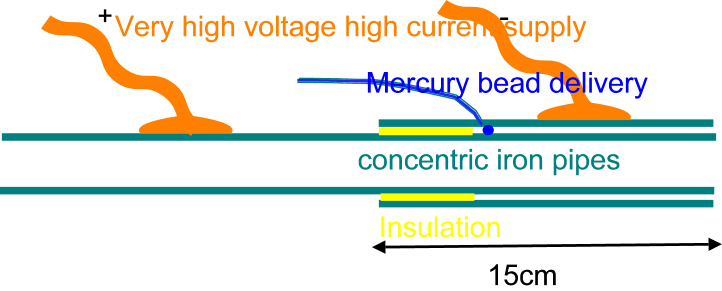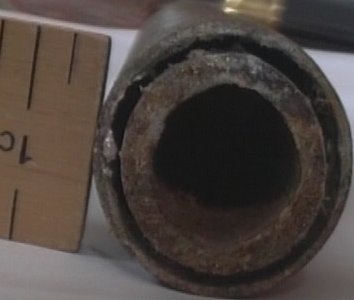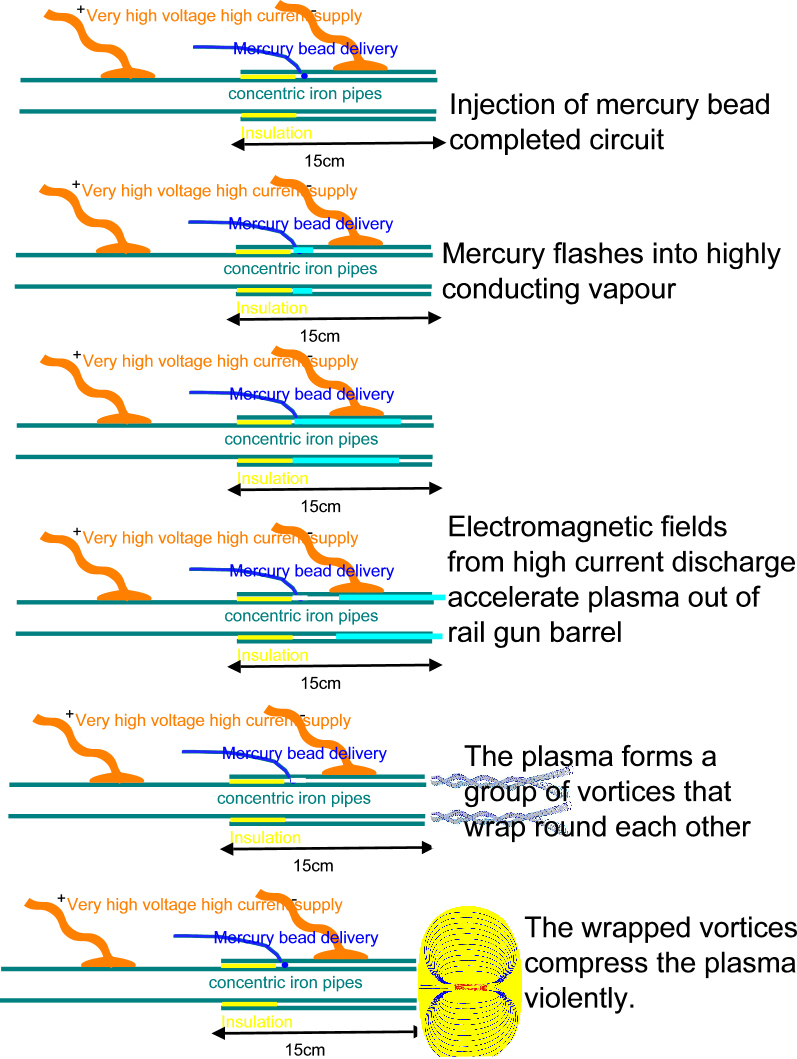The Mercury Vortex Rail Gun
How useful is this
© Peter Thomson 2002 /2003
WARNING Mercury vapour is highly toxic even in very small amounts. This
apparatus will instantly convert a bead of mercury into a cloud of mercury
vapour. The vortex is extremely hot 2000C or higher.
If the vortex detonates it will blow your lab apart.
This information is published in the interests of open science. Not so
you can try it for yourself in your back yard.
This apparatus is extremely simple, small and robust. It consists of two
concentric iron pipes with a small gap between them. I have used steel water
pipe, but all traces of galvanising must be removed from the facing surfaces
or the zinc will react with the mercury. An Iron container won't react with
mercury, other metals such as copper will.
The inner pipe needs to be longer than the outer so that a good electrical
connection can be made to it.
The pipes are held apart by heat resistant insulation at the end
away from the muzzle. Fire cement works well (designed for small repairs
in furnaces).
The concentric arrangment of the pipes means that the forces generated
by firing the rail gun are symetrical, and the vapour is confined to get
maximum acceleration.


I have fired this thing supported in a large bucket of dry sand, pointing
vertically upwards.
For the current needed to fire a rail gun, look at some of the accounts
by enthusiasts on the web. A large capacitor bank that can sustain very rapid
discharge is needed. You also need a trigger that you can fire remotely!
(Note again that high currents at high voltage are
also very dangerous)
For a single shot firing mode, introduce a small bead of mercury into the
muzzle (in the gap betwen the pipes) and led it move to the base.
Check that it is making a good electrical connection between the concentric
tubes with a multimeter.
Ensure that you can contain a very hot cloud of mercury vapour and condense
it back to mercury.
Ensure that there is nothing that will be damaged by a detonation!!
Film through arc welding goggles or you will lose the chip in your camera.
For a slightly more sophisticated system, use the injection of a bead of
mercury into the base of the vortex gun as the trigger for the discharge.

The end view shows the gun after test firing. Beads of iron have eroded
from the steel wall and deposited on the end of the muzzle before cooling.
There are two potential vortex modes from this apparatus. The first is
similar to a smoke ring, detached from the gun and moving away from it.
The second is where small vortices form in the gun and these wrap round
each other as they are ejected but remain attached to the inner tube.
The next step would be to dissolve a little boron in the mercury before
firing!!.

I have taken the practical experiments as far as my resources will allow.
I don't have the facilities to continue in safety, or the instrumentation
to measure what is happening. It is far too hot, too fast and too dangerous.
But I am sure there are plenty of you who do have the resources and facilities
for a few extra experiments.
Please report back - keep science open.
This information is copyright Peter Thomson 2001-2004
tornado experiments The Mercury Vortex Rail Gun in Iron Pipe
| Andrew Tennenbaum |
|
Do you think it would be possible to use a bead of solder in the place of mercury? This would be much safer, and the melting point of solder is still very low, considering the temperatures we're dealing with
How useful is this message about tornado experiments The Mercury Vortex Rail Gun in Iron Pipe? |
tornado experiments The Mercury Vortex Rail Gun in Iron Pipe
| Peter |
|
Certainly worth the experiment!
Let me know iff you try it
How useful is this message about tornado experiments The Mercury Vortex Rail Gun in Iron Pipe? |
tornado experiments The Mercury Vortex Rail Gun in Iron Pipe
| kevin |
|
What, if you used something like aluminum or lithium instead of mercury? vaporise it using some truly extreme cap banks, and allow it to fire and to form the compressed plasma. you said that electrons are fired or emitted towards the electrode, or tend to group at that end. What if you cap the end electrode with a smooth ball like cap, and charge it to an extreme negative potential. would this move the self-contained plasma away from the gun? if by using a lighter metal such that as the nuclei undergo fusion, they release energy into the system, could you make something similar to a 'plasma rifle
How useful is this message about tornado experiments The Mercury Vortex Rail Gun in Iron Pipe? |
Copyright Peter Thomson 2012-March-16
